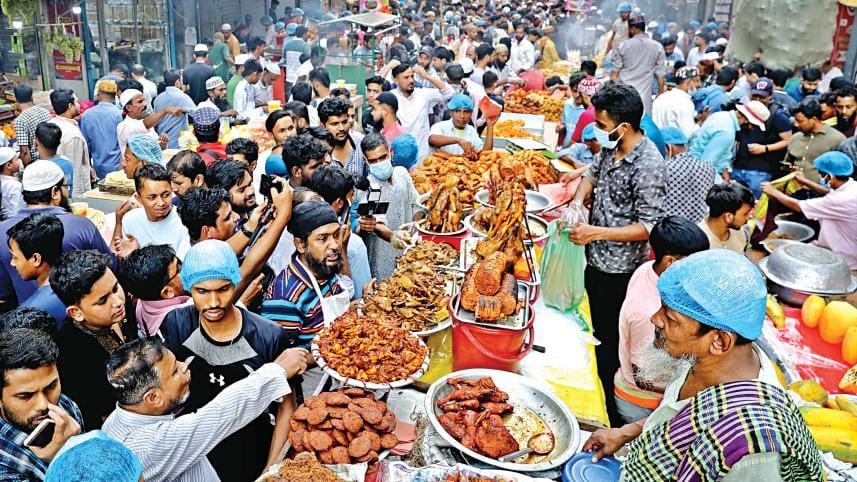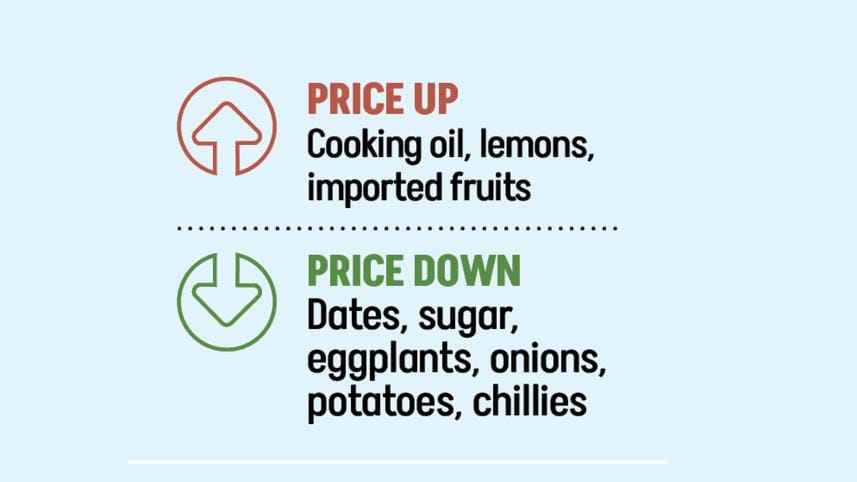Prices of iftar staples hold steady, mostly

This Ramadan, Dhaka residents are finding some comfort in the mostly stable prices of food items and ingredients considered essential for the preparation of iftar meals.
Compared to previous years, the situation is better this time around due to an abundance of winter vegetables, essential food items and ingredients.
The Daily Star visited several key kitchen markets, including Kazipara, Mirpur-11, Ibrahimpur, Kochukhet, and Karwan Bazar yesterday, and found that buyers are generally able to get what they need according to their purchasing power, save for cooking oil and lemons, which are now out of reach for many.

Consumers are particularly frustrated with the supply and pricing of soybean oil, one of the most essential commodities.
Traders say the supply of edible oil is insufficient compared to the current demand.
The price of loose soybean oil has surged by Tk 30-40, now selling at Tk 185-200 per kg, up from Tk 155 last Ramadan.
A five-litre bottle of soybean oil is priced at Tk 852, compared to Tk 780 last year.
Chickpeas have also seen a price hike, now selling at Tk 105-120 per kg, up from Tk 100-115.
The price of four lemons ranges between Tk 40-120, whereas last year it was Tk 20-80.
The prices of most imported fruits have increased by Tk 20-40 per kg, while local fruits, including bananas, are up by Tk 10-20 per dozen.
Apples, oranges, and sweet oranges are now being sold at Tk 300-380 per kg, compared to Tk 270-350 last year.
Eggplants, a key ingredient in iftar meals, have doubled in price within a week, currently selling at Tk 60-100 per kg. However, it's still cheaper than last year when the price surged up to Tk 200 per kg.
The prices of broiler and Sonali chicken have increased by Tk 10 per kg compared to last year. Broiler chicken is now priced at Tk 200-210 per kg, while Sonali chicken is being sold at Tk 300-320 per kg.
Meanwhile, the prices of pulse, beef, and fish remain unchanged from last year.
On a positive note, the prices of several essentials, including sugar, grass peas, dates, onions, cucumbers, potatoes, tomatoes, eggs, garlic, green and dry chillies, ginger, and isabgol, have decreased.
Sugar is now priced at Tk 125-130 per kg, down from Tk 140-150 last year.
The price of normal dates has fallen to Tk 180-200 per kg from Tk 220-250, while mid-range and premium quality dates are being sold at Tk 450-800 and Tk 1,000-1,800, respectively—Tk 30-200 per kg lower than last year.
Local onions are now available at Tk 40-50 per kg, significantly lower than last year's Tk 100-120.
Potatoes are being sold at Tk 20-30 per kg, compared to Tk 25-35 last year.
Additionally, winter vegetable prices have decreased by Tk 5-20 per kg compared to last Ramadan.
Mohammad Gofran, proprietor of Cumilla General Store in Karwan Bazar, said, "Except for soybean oil, the prices of most grocery items are satisfactory as supply is abundant. While some essentials have become more expensive, overall, prices are stable, and several items have even become cheaper."
Jahangir Alam, a private sector employee from Tejgaon's Begunbari area, said, "Prices of onions, potatoes, tomatoes, green chilies, and eggs are reasonable this year. However, stricter government monitoring could have helped stabilise the prices of items that have gone up."
Saleha Begum, a domestic help from the Karwan Bazar area, said she spent Tk 1,000 and bought oil, chicken, onion, chickpeas, pulse, sugar, isobgul, and various spices.
"Prices of some items have fallen, while others have risen. All in all, the situation is stable. However, if prices fall further, it will be helpful for people like us who struggle to make ends meet."





 For all latest news, follow The Daily Star's Google News channel.
For all latest news, follow The Daily Star's Google News channel.
Comments